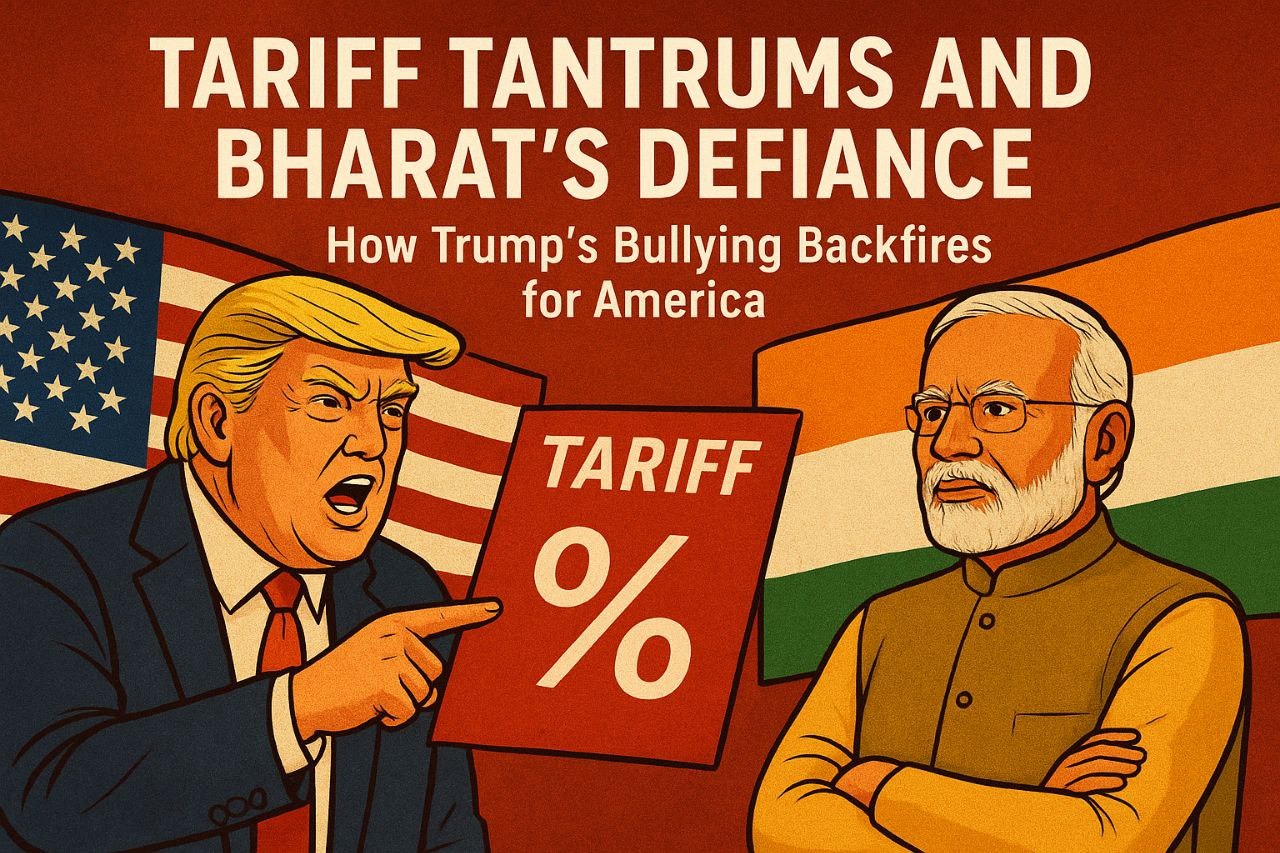Tariff Tantrums and Bharat’s Defiance: When Trump’s Bullying Backfires on America

In the theatre of international politics, few acts reveal the fragility of power more than when strength masquerades as swagger. U.S. President Donald Trump’s imposition of a staggering 50% tariff on Indian goods was presented as a patriotic defense of American workers. Yet beneath the surface, it exposed not resilience but a deeper strategic confusion within Washington. It was not an act of policy but an act of petulance, an attempt at bullying that, rather than bending Bharatvarsh, ended up undermining America itself.
“When a leader uses tariffs as weapons, he risks alienating partners and weakening the very alliances that sustain his own nation’s future.” ~ Adarsh Singh
The Anatomy of Bullying Diplomacy
Unlike previous trade negotiations, Trump’s tariffs, the steepest ever imposed by the U.S. against any country, were not shaped by sound economics but by bruised ego. His move came on the heels of being publicly rebuffed for third-party mediation in the May India-Pakistan crisis. Humiliated and sidelined, Trump retaliated with punitive tariffs that stunned New Delhi and even rattled seasoned voices in American policy circles.
While he justified the action by citing “one-sided trade” and India’s import of Russian oil, the logic crumbled quickly. China, the largest importer of Russian oil, remained largely untouched. The inconsistency betrayed that this was less about economic balance and more about personal grievance.
U.S. strategic affairs expert Ashley Tellis observed, “Policy disagreements over oil and trade are just a mask, Trump feels personally slighted, and the entire relationship is hostage to his ego.”
Similarly, British Foreign Secretary William Hague warned, “India cannot be bullied into submission. If threatened, it simply expands its circle of friends, often to America’s rivals.”
This was no longer diplomacy. It was bullying dressed up as strategy.
Shifting Fault Lines and Strategic Self-Harm
Instead of reinforcing U.S. leadership, Trump’s gambit exposed cracks in America’s foreign policy framework. Former U.S. National Security Advisor Jake Sullivan accused Trump of letting personal and financial interests dictate strategy, even suggesting links between his Pakistan business ties and the punitive tariffs.
The charge was damning:
“When enterprise trumps principle, a nation ceases to be a leader and becomes merely a dealer.” ~ Adarsh Singh
By weaponizing tariffs, Trump jeopardized decades of painstaking progress in building trust with Bharat, the world’s largest democracy and a crucial ally in Asia. The sectors hit hardest, textiles, gems, jewelry, and chemicals, are lifelines for millions of Indian workers. Yet Bharat did not flinch. Calmly but firmly, India denounced the move as “unjustified and unreasonable,” refusing to concede sovereignty for short-term relief.
The message was clear:
Bharatvarsh would not barter dignity for trade concessions.
Bharatvarsh’s Enduring Defiance
Few nations possess the civilizational depth and resilience of Bharatvarsh. History has forged in it a strength that thrives under pressure.
“Bharatvarsh is not defined by the tariffs it faces, but by the spirit with which it faces them.” ~ Adarsh Singh
Rather than retreating, India recalibrated. New trade partners were sought, alliances deepened, and supply chains diversified. Far from weakening India, the U.S. tariffs accelerated its pivot toward greater self-reliance and broader global engagement.
Ironically, America’s heavy-handedness has nudged Bharat closer to Russia and China, undermining Washington’s long-term strategic interests in South Asia. The ambitious U.S.-India trade roadmap of doubling bilateral trade to $500 billion by 2030 now hangs in uncertainty.
Former Trump adviser John Bolton called the tariff strike “an unforced error”, but the real wound is deeper: the erosion of goodwill and trust that had taken generations to cultivate.
The Global Stage: Lessons from Bharatvarsh
History offers a sobering reminder: bullying diplomacy seldom works. It may yield momentary concessions, but it corrodes trust and credibility, the very currency of lasting leadership. Bharat’s dignified defiance is more than a tactical maneuver; it is a lesson in patience, principle, and strategic clarity.
“Empires do not collapse because of external storms; they fall when they abandon wisdom within.” ~ Adarsh Singh
The episode reveals the dangers of arrogance masquerading as policy. It highlights the limits of unilateralism in a multipolar world. Most importantly, it shows that Bharatvarsh, with its calm and resolute stance, is shaping itself not as a subordinate in global affairs but as a sovereign power unwilling to be cowed.
A World Watching
As America turns inward, wielding tariffs like cudgels, it risks isolating itself in a rapidly changing global order.
Bharatvarsh, meanwhile, has emerged stronger, its defiance reinforcing its role as a dignified, principled actor on the world stage.
The lesson is timeless:
“True partnership flourishes not in the shadow of tariffs, but in the sunlight of trust and respect. Bharatvarsh’s quiet strength is the lesson America forgot, but the world will remember.” ~ Adarsh Singh
Thu Sep 4, 2025
